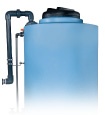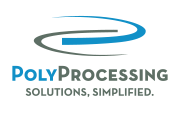4 Poly Tank Dairy Applications for Cheese Production
From the cow to the final product, dairy production is methodical about ensuring the end user gets the best possible final product, safely. But just what steps does dairy go through to get milk products to their respective end states, that being possibly cheese or whey powder?
Thankfully, there are several key services that Poly Processing can provide to help with the storage necessary for the production of dairy products, especially cheese.
Brine Storage Tank Solutions
Sodium chloride brine solutions consist of a specific amount of salt and water mixed together. This brine solution can be used in all kinds of industries, especially for dairy production. In 2008, Wisconsin-based dairy producer F&A Dairy began using salt brine to produce cheese. The company uses between 3,000 to 5,000 gallons of salt brine each week. If you are looking to use salt brine for dairy production or cheese processing, you must have the right type of tank that can prevent freezing with the help of heating pads and insulation, allow for ventilation to contain tank dust, and maintain sufficient levels of water and salt so that the brine is consistently the correct concentration.
Fiberglass reinforced plastic (FRP) and cross-linked polyethylene (XLPE) are the storage tank material options for brine storage. As a more cost effective option, cross-linked polyethylene also offers a faster production time, longer warranty, and a product less prone to damage.
CIP Tanks
CIP, or clean-in-place, chemicals allow for the interior surfaces of the tanks to be cleaned without taking the tank apart. A variety of high purity chemicals and cleaning agent formulas are used to clean and sanitize process equipment. Food grade high purity acids used include chlorine dioxide, nitric acid, and phosphoric acid. Cleaning agents, soaps, and surfactant-based formulas are also used to clean the process equipment.
High purity acids and surfactants create unique storage challenges, and having the right CIP chemical storage tank solution is critical if you want to maintain a sufficiently clean tank area for dairy to be processed in, or to keep the ingredients in the right condition. The proper tank for CIP chemical storage is one that will resist bacteria growth to facilitate storage of such high purity cleaning chemicals, while maintaining inherent strength and the ability to withstand the damaging effects of surfactants.
Whey Storage And Processing
According to the United States Dairy Export Council, whey was once considered a waste product, but is now viewed as a valuable byproduct of cheese making. Nowadays, cheese makers actually recycle this waste in a very interesting way. First they separate the liquid whey from the solid cheese. They then treat this liquid whey, often drying it out and shipping it to a production company that will then add the dry, powder whey to protein shake mixes or meal bars.
If you want to have the necessary storage tanks to store your dairy processing materials to produce enough whey, you need to choose tanks that are sufficiently resistant to bacteria and capable of full tank drainage, which allows you to get more out of the tanks that you use for storing food ingredients.
pH Adjustments
Dairy production involves several processes that generate wastewater, such as chilling, pasteurization, and homogenization. This wastewater is treated primarily by the adjustment of its pH levels through the use of acid and base chemicals. The chemicals used in the treatment of dairy wastewater must be treated properly so that it can be efficiently reused for other processes. The leftover brine from wastewater treatment, for example, can be reused in certain types of dairy production.
All sorts of dairy processes involve different types of storage tanks that can fulfill various requirements.
If you are interested in learning about the exact kind of tank that is best for your process, get in touch with a chemical storage expert. These specialists can help you choose a tank that is best for your needs based on the specific kind of dairy products being produced.
If you are interested in learning more about the pH adjustments of wastewater, we invite you to download your own copy of our Complete Guide to the Wastewater Treatment Process.
- October 8, 2014
- Topics: Applications
About Poly Processing
Posts By Topic
Tech Talk Podcast Episodes
Subscribe By Email
Recent Posts
- Ferric Chloride Storage: What Operators Need to Know Before Choosing a Tank
- Wastewater Treatment: Modern Approaches to Sludge Removal & Chemical Management
- Why Cycling Causes Tank Failure: Tips for Prolonging Tank Life
- Small Changes in Tank Selection for Big Long-Term Cost Benefits
- NSF Certification vs. FDA Compliance: Understanding Chemical Tank Standards
Tank Configurator

Find the recommended tank and system components for your chemical storage challenge.
Configure a Tank Package



